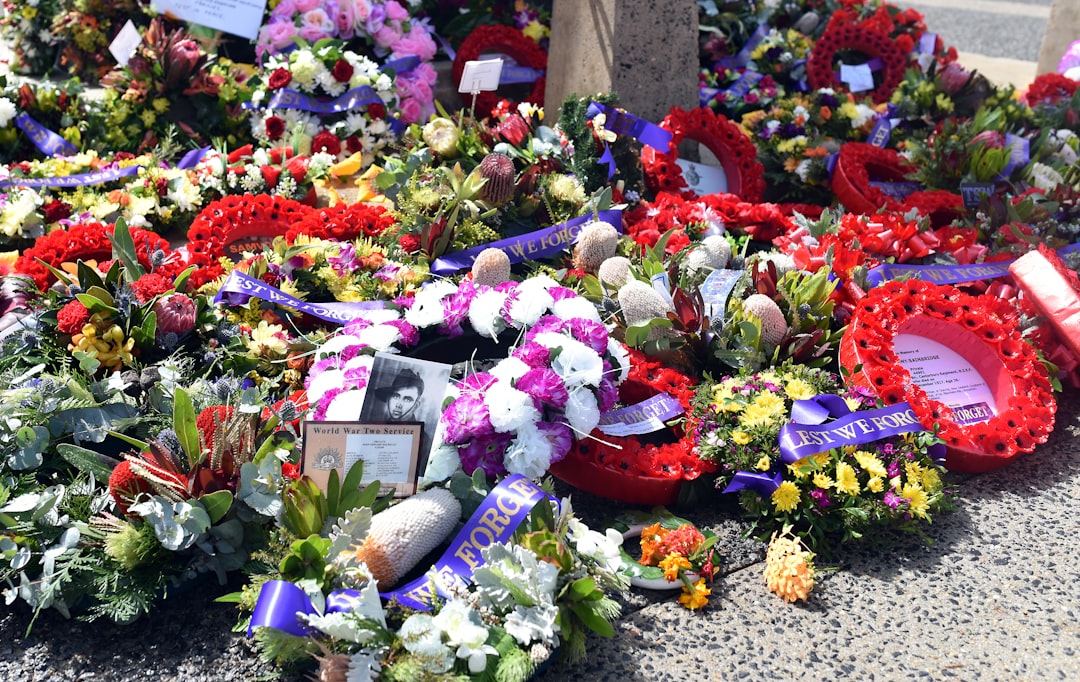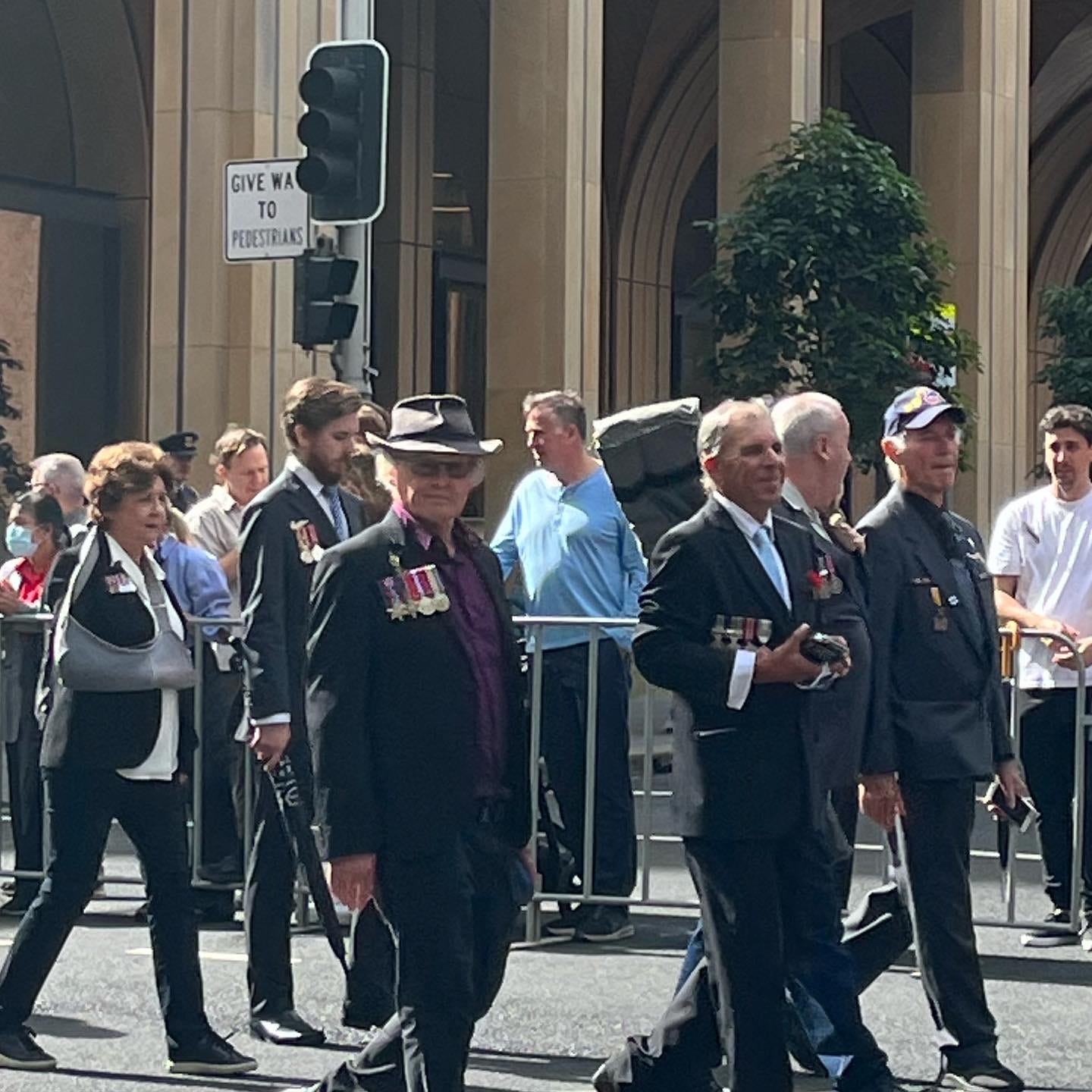DISPATCHES FROM AUSTRALIA: The emotion and memories of an ANZAC March
They shall grow not old, as we that are left grow old;
Age shall not weary them, nor the years condemn.
At the going down of the sun and in the morning
We will remember them.
The Ode comes from For the Fallen, a poem by the English poet and writer Laurence Binyon and was published in London in The Winnowing Fan: Poems of the Great War in 1914. This verse, which became the Ode for the Returned and Services League, has been used in association with commemoration services in Australia since 1921.
For the first time in a very long time, I had the honor of spending ANZAC Day 2022 (Monday, April 25) at home with my family in Sydney, Australia. My dad participated in the Dawn Service and later in the march through the city streets in an honor of his father, WW2 veteran Bill McKay.
It prompted me to gather some thoughts on the deeply momentous and emotional occasion…
Nana gives me my first lesson about war, which further reveals my obsession with bullets and sorrow. I’m about six years old, thumbing through black-and-white photos and learning about my grandfather, Bill McKay, my dad’s father I never met.
It is April 25, 1992. ANZAC Day. I remember it. Even though I am very young, I remember it.
My grandfather, who served in the Madang Providence of Papua New Guinea, 47th Battalion, 5th Division Camp in the Australian Army, was just twenty when deployed to the blood-strewn swamp for years. He enlisted on January 18, 1943, and was discharged on June 20, 1946. Bill left the battlefield after Japan surrendered in September 1945. Yet he never really left the battlefield – his mind still trapped in the theater of a lush tropical jungle marred by the stench of rotting corpses and gunpowder under the unforgiving heat – and the ghosts that idled alongside him day in and night out.
While granddad died long before my birth, it was through his story – told to me in a patchwork of painful puzzle pieces through childhood – that I learned many lessons about life and love and the notion that enemies can take your life without killing.
Nana was sixteen, working as a cook in a far north Queensland pub to help her nine siblings after her father – a coal miner – developed a miners typhus dust disease in his lungs when she met Bill. He returned from combat and worked in the grocery shop next door.
“I often used to sit outside the pub talking to him while waiting for my boyfriend to pick me up to go to the pictures. My first impression was sympathy. I felt sorry for him. He looked so broken down,” Nana recalls. “He couldn’t hold a glass without shaking. He had no friends and asked me to go to the movies one night. So I went with him. He crept in between my then-boyfriend. I didn’t know he was drinking then – he hid that from me.”
Bill and Rita soon married, and children came along. Only Bill’s anguish deepened – as did his addictions.
“He didn’t like to talk about the war but opened up at times when he had been drinking. He recalled horror war atrocities but was mostly affected by the bodies of native women and children being brought into their army camp from having been mutilated by Japanese soldiers,” Nana continues, talking to me like a long-lost friend and not a child. “He started drinking more and working less. I had a drink from his (water) bottle one day, and that’s when I discovered he was drinking metho (methylated spirits) when he couldn’t afford the grog… There were good parts to him away from the grog. He really loved his kids.”
Australia joined World War II with an entirely voluntary force in 1939. However, thousands of Japanese soldiers landed on the New Guinean mainland in early March 1942, and tensions flared.
After suspending the Japanese advance, the allied forces went into an offensive mode in the middle of 1943, known as Operational Cartwheel. Furthermore, it marked the closest and most successful cooperation between Australian diggers and U.S. soldiers. These triumphs, however, were marred by extreme bloodshed and debilitating tropical diseases such as dengue and dysentery.
As I absorb these passed-down dispatches about my grandfather, six years old and bright-eyed, I believe war and all its violence belong to the days of antiquity. My naivety and a peaceful country shroud me. However, I also understand the strength embedded in my Nana, my warrior, who raised her babies alone, still a baby herself.
When my dad was about four years old, his dad left their ramshackle home with all his monsters in tow.
“I vaguely remember a ground floor verandah with lots of yelling from my grandmother, pushing and telling my father he had to go,” my dad tells me years later. “I remember a big fuss over something he was maybe drinking in an outside toilet or shed.”
Then Bill left for a long time, founded another family, and died alone of alcohol poisoning. He was forty-one. The trauma was wrapped in shame: a tough bloke on the outside, but a mangled soul on the inside, one who could not talk about or even comprehend the darkness he had lived and re-lived.
“Can you see awful things and not be hurt?” I ask my mother, who holds my hand and shakes her head.
Even as a small girl growing up in Australia’s coarsened countryside, I understand that April 25 is the day not to cry, complain, or run amok through the cocoa-colored tracks. At dawn, my father awakens my sister and me. The arid landscape is still softened by the rouge glow, and the impression of a pillow still tingles my round cheeks.
As a child, my Uncle Glenn – and later my father – would wear a string of gold and silver medallions with brightly colored ribbons jingling from his right breast. These belonged to my grandfather. We join dozens of Australian families every year on April 25 for ANZAC Day prayers and silent weeping. In my own father, I can sense the burden of generational pain. But, of course, I don’t have such a complicated name for it. Though he rarely mentions it, sometimes over a beer and only ever on Anzac Day, dad tells me that war robbed him of a father.
It is the only time I ever see my father’s hardened face crumple, trying not to fall apart entirely.
ANZAC – which stands for Australia and New Zealand Army Corps – is arguably the country’s most important national holiday. It was initially intended as a tribute to the anniversary of the first allied engagement in World War One, in which tens of thousands of lives and limbs were lost when bombs and bullets fell on ANZAC troops attempting to conquer the Gallipoli Peninsula.
Nevertheless, as the number of foreign wars and peacekeeping missions has risen, the occasion has come to honor all conflicts.
Nana reads to me the inscription from a photograph of the Kemal Atatürk Memorial, Anzac Parade, in Canberra. I cling to the closing lines:
You, the mothers,
Who sent their sons from far away countries
Wipe away your tears,
Your sons are now lying in our bosom
And are in peace
After having lost their lives on this land, they have
Become our sons as well.
In the decades since being a child, I have watched as my father – a 1970s long-haired hippie drafted into the Vietnam War as a university student but exempted due to Australia’s engineer shortage – surrender his anger for pride.
“At the time of his passing, I don’t think I felt anything. My father was somebody back then that I thought I didn’t know,” dad wrote to me one Spring morning as I prepared for an overseas assignment. “But the ensuing years, I feel I know him more than I realized. Now each Anzac Day, I catch up to him and thank him for his service.”

For those interested in learning more about the aftermath of war, please pick up a copy of my latest book “Only Cry for the Living: Memos from Inside the ISIS Battlefield.”
If you want to support small business:
And also now available Down Under!
My new coffee table book with the amazing photographer @JakeSimkinPhotos is additionally available for pre-order, slated for release later this Spring: Afghanistan: The End of the US Footprint and the Rise of the Taliban Rule
Thanks again for your support. Follow me on Instagram and Twitter for more updates. Please consider a paid subscription to help me continue to do this work.






